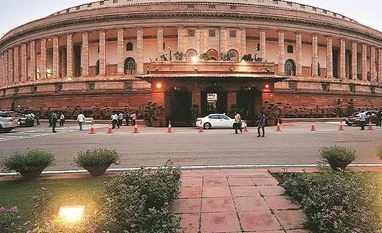Parliament on Thursday approved the Finance Bill, 2017, after the Lok Sabha rejected the five amendments to the Bill passed by the Rajya Sabha on Wednesday. However, the Opposition parties on Thursday indicated that the goods and services tax (GST)-related Bills will face a fate similar to the Finance Bill in the Rajya Sabha.
The GST-related Bills will be discussed in the Rajya Sabha next Wednesday, when Parliament reconvenes after a short break on account of Ram Navami.
Opposition parties, particularly the Congress and Trinamool Congress (TMC), plan to move an amendment to the Central GST and Integrated GST Bills. The Congress and TMC object to the GST Council being the final authority on fixing tax rates — without the need to seek parliamentary approval — making it superior to the legislature.
The amendment moved by TMC’s Rajya Sabha member Derek O’Brien seeks to alter the language of the Bills to replace the line that tax rates “as may be notified by the government on the recommendations of the Council”, with “…recommendations of Parliament”.
Opposition sources said the parties would unitedly vote to have the Rajya Sabha adopt the amendment. However, this amendment will be, as was with the Finance Bill amendments, likely to be overturned by the Lok Sabha since the GST Bills are “money” Bills.
It also remains to be seen if the TMC votes with other Opposition parties. In the Rajya Sabha on Wednesday, the TMC members did a strategic walk-out while the Congress, the Samajwadi Party, the Communist Party of India (Marxist), the Bahujan Samaj Pary and others voted to have the Rajya Sabha adopt amendments to the Finance Bill. Congress’ Deepender Singh Hooda said it was historic since never before had the Rajya Sabha amended the Finance Bill. The Trinamool’s Saugata Roy criticised the “draconian” powers given to taxmen. On the issue of political funding, Biju Janata Dal's (BJD's) Bhartruhari Mahtab said the Finance Bill proposals would open the floodgates for corporate funding for political purposes, which isn’t entirely desirable.
The Shiv Sena’s Anandrao Vithoba Adsul also stressed the need for transparency in political funding and a limit on the money which is given to a party. The amendments in the Rajya Sabha proposed to delete provisions relating to the powers given to taxmen, like requisitioning books of accounts, powers to survey and more powers of search and seizure. Amendments also related to doing away with the Finance Bill proposal to remove the cap of 7.5 per cent of net profits of the last three financial years for donation to political parties. The Lok Sabha rejected these amendments. With the approval of Finance Bill, 2017, Parliament completed the Budget exercise before the start of the next financial year on April 1, giving the government more time to implement welfare-spending programmes and taxation plans.
Finance Minister Arun Jaitley had presented the Budget on February 1, a first in the history of Independent India. The passage of the Bill, after the presidential assent, will ensure the budgetary proposals take effect from April 1.
More From This Section
Replying to the debate, Jaitley said the Rajya Sabha amendment capping political donation by companies could not be accepted, as it would limit the number of donors to political parties.
On the change approved by the upper house to curb more powers to taxmen, he said the government, as a matter of "abundant caution" and to protect whistle-blowers, had provided that the "satisfaction note" or the reasons for initiating a search or survey would be shared only with court and not with the person or entity in question.
With regard to electoral funding, the finance minister said: "I am only hearing adjectives like 'it must be clean', 'it must be transparent'. Please give me an ideal combination of the two. We are willing to consider it. I will wait for a specific suggestion.”
)